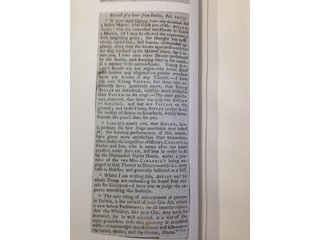Transcription
Extract of a latter from Dublin, Feb. 10.
“If your rival Operas have any occasion for Ballet-Master, what think you of Mr. ASTLEY, Senior? who has instructed two Horses to dance a Minuet, (if I may be allowed the expression,) with surprising grace; the thought has sufficiently repaid him; full houses, unbounded applause, every time the horses appeared—neither are they confined to the Minuet alone, for I assure you, I have seen other Dances performed by the horses, each keeping time to the music, in a manner truly extraordinary. Young ASTLEY’s Benefit was last night—the house filled with fashion and elegance—a greater overflow never was known at any Theatre.—I have not seen Young VESTRIS, but those who repeatedly have, positively assert, that Young ASTLEY on horseback, exhibits more attitudes than VESTRIS on the stage.—The same gentleman observed, that there was only one ASTLEY on horseback, an d but one VESTRIS on the ground; and to do Young ASTLEY justice in all his variety of dances on horseback, would better become the pencil than the pen.
“I can also assure you, that ASTLEY, Sen. is perhaps the best Stage machinist ever heard of; the Scenical [sic] performances of this season, have given more satisfaction than heretofore, when under the inspection of Messrs. CABANELL, Father and Son, who it seems after then years practice under ASTLEY, lft him in order to fit up the Haymarket Opera House, under a promise of the two Miss CABANELL’s being engaged at that Theatre as Dancers—this is a story told in Dublin, and generally believed as fact.
“Whilst I am writing this, ASTLEY and his whole Troop are embarking on board four vessels for Liverpool—I leave you to judge the expense attending this business.
“The only thing of consequence at present in Dublin, is the revival of your Gin Act, which is now before Parliament; we all heartily rejoice that the Whiskey, like your Gin, may meet its downfall, for be well assured, it is one of the most pernicious evils this country is troubled with—it encourages drunkenness and idleness—the latter, thefts; and the former, illness”
